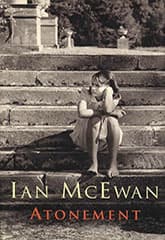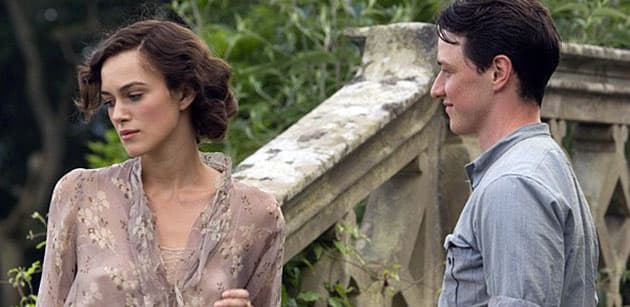Atonement
Critique • Quotes • At the movies
 First edition
First editionAtonement
First publication
2001
Literature form, historical fiction
Novel
Genres
Literary
Writing language
English
Author's country
England
Length
Approx. 123,500 words

Keira Knightley and James McAvoy figure in a misjudged romantic relationship in Atonement.
The illusory comeback
Atonement (1990): Film, 123 minutes; director Joe Wright; writer Christopher Hampton; featuring James McAvoy, Keira Knightley, Saoirse Ronan, Romola Garai, Vanessa Redgrave, Brenda Blethryn, Benedict Cumberbatch
Atonement is a novel that turns on several scenes, each of which changes the reader's understanding of what has gone before. To be successful in the same way the novel succeeds, an adaptation has to stick very closely to those plot turns and changes of perspective. And Atonement the film does this brilliantly.
Yes, the story is compressed for film and many of the nuances are skipped—though none come to mind, so seamless is the production. And the anti-climactic ending of Ian McEwan's novel, with the elderly Briony dithering over her own novel of Atonement and attending in her dotage a party in her honour at the scene of her childhood crime, is excised—though I'm wondering if even McEwan might consider this an improvement.
What the movie does is take the focus off Briony Tallis, despite her getting the most screen time in her three stages of life. It gives the ill-fated lovers, Briony's elder sister Cecilia and her lower-class lover Robbie Turner, a chance to steal the spotlight. Keira Knightley and James McAvoy oblige.
This film is often called a romance, but theirs is an earthy, needful relationship between two fallible but honest people. When Cecilia whispers, "Come back to me," in Robbie's ear at several points, he takes it not as a romantic catchphrase, but as she meant it: an instruction necessary for them to have any hope of having happy lives.
Which makes our final understanding of their fate all the more poignant.
Along the way, the cinematography is beautiful, perhaps too beautiful. Especially in the first part of the movie, at the Tallis family's rural mansion and on their vast grounds with ponds and woods and meadows, life appears deceptively idyllic. As in the book, there's a bit of a Jane Austen vibe in these scenes, with 13-year-old Briony (Saoirse Ronan) in the role of the proudly precocious, young female who gets everything wrong—though the edges in Atonement are much sharper.
Interesting, at least three figures in the making of Atonement—director Joe Wright, Knightley, and Brenda Blethryn, playing Robbie's housekeeper mother—were also involved in the adaptation of Austen's Pride and Prejudice (2005).
However pretty the film-work is in the early going, it achieves another level in the second part when it follows Robbie as a wounded British soldier in Europe trying to survive to return to his love. The scene on the beach at Dunkirk, with its complex, weaving, five-minute-long tracking shot showing the thousands of troops engaged in diverse desperate activities while they await unlikely rescue is overwhelming.
The long tracking shot on the beach at Dunkirk in Atonement.
If you haven't read the book, the later scenes back in London with a repentant Briony meeting with the people whose lives she's ruined might seem unrealistic. Even if you do know the story, you may still find yourself being pulled into the drama of their relationships.
Or you may, like me, marvel at how the trick was being played and wonder how the filmmakers were possibly going to make the big reveals.
And then the turns are revealed so naturally. It helps to have that cagey old actor Vanessa Redgrave as the elderly Briony, actually playing a little older than herself then, calmly presenting the final fiction. And helping us believe in it one more time.
— Eric

